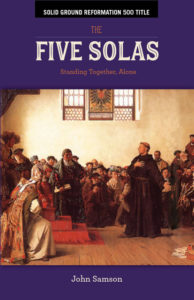http://www.lds.video/
Gloria Patri
![]() The “Gloria Patri” is a distinctly Trinitarian ancient hymn of the Church. All three Members of the Trinity are addressed in parallel form. Historically, the Gloria Patri became universal among Christians after the Council of Nicea (towards the end of the 4th Century AD).
The “Gloria Patri” is a distinctly Trinitarian ancient hymn of the Church. All three Members of the Trinity are addressed in parallel form. Historically, the Gloria Patri became universal among Christians after the Council of Nicea (towards the end of the 4th Century AD).
‘Gloria Patri’ is the summary title of the full Latin phrase some might recognize in the words, “Gloria Patri, et Filio, et Spiritui Sancto” meaning “Glory to the Father, the Son, and the Holy Spirit.”
In English:
Glory be to the Father, and to the Son:
and to the Holy Ghost;
As it was in the beginning, is now, and ever shall be:
world without end. Amen.
Two words that help our understanding:
(1) Doxology – a short hymn of praise to God found in various Christian assemblies.
(2) Liturgy – the form in which religious worship is conducted. In a very real sense, every Church service has some sort of liturgy, even when it is not written down.
Jesus said, “I will build My Church and the gates of hell will not prevail against it” (Matt. 16:18). As we sing the Gloria Patri, there is a sense of historic awe in singing in unity with Christ’s Church through the ages, proclaiming the one true God as Father, Son and Holy Spirit. We do so in English, of course, while it is interesting to see these same words expressed in other languages (gathered from Wikipedia):
Latin: 
Gloria Patri, et Filio, et Spiritui Sancto,
Sicut erat in principio, et nunc, et semper, et in saecula saeculorum. Amen.
Greek:
Δόξα Πατρὶ καὶ Υἱῷ καὶ Ἁγίῳ Πνεύματι,
καὶ νῦν καὶ ἀεὶ καὶ εἰς τοὺς αἰῶνας τῶν αἰώνων. Ἀμήν.
Arabic:
المجد للآب و الابن و الروح القدس
.الان و كل أوان و الى دهر الداهرين، أمين
East Syriac (used by the Assyrian Church of the East and the Chaldean Catholic Church):
Shouha tababa, W-brona, W-ruha dqudsha,
min’alam w’adamma L-’alam, Amen.
The Five Solas: A Pastor’s Feedback
 “Honestly, I cannot tell you how much I loved your book! As a pastor who is desperately trying to lead my people into a greater understanding of Scripture and how they relate to these glorious truths of the Reformation, this book is such a valuable tool. In New England pews, there is a strong sentiment even among Biblical evangelical churches towards Rome. Many fail to see the damaging effects of their theology, mostly out of ignorance of what separated Rome from true Biblical Christianity during the Reformation, summed up in the five solas. Therefore having a tool like this book that is clear, concise and most importantly, soaked with Scripture’s truth helps tremendously in teaching my people in a way that is not intimidating. I have found that laymen who are not accustomed to reading large, thick, old and difficult works will simply never read them, no matter how highly and passionately you encourage them. Your book however, provides something that a layman will not only be more inclined to read, but also understand. I can tell you purposely left out many of the Reformed “buzz words” that can turn off a layman who may not be as familiar with the terminology. As a pastor, my priority is shepherding and growing my people, but finding materials that are usable in the context of a reforming church is a very tough thing. This is why I am so thankful for your book and I am looking forward to seeing how God will utilize it in the lives of my people! I plan on buying a case of them to give away at my church and would highly recommend that any pastor who is seeking to lead their congregation into a greater understanding of these glorious truths do the same!”
“Honestly, I cannot tell you how much I loved your book! As a pastor who is desperately trying to lead my people into a greater understanding of Scripture and how they relate to these glorious truths of the Reformation, this book is such a valuable tool. In New England pews, there is a strong sentiment even among Biblical evangelical churches towards Rome. Many fail to see the damaging effects of their theology, mostly out of ignorance of what separated Rome from true Biblical Christianity during the Reformation, summed up in the five solas. Therefore having a tool like this book that is clear, concise and most importantly, soaked with Scripture’s truth helps tremendously in teaching my people in a way that is not intimidating. I have found that laymen who are not accustomed to reading large, thick, old and difficult works will simply never read them, no matter how highly and passionately you encourage them. Your book however, provides something that a layman will not only be more inclined to read, but also understand. I can tell you purposely left out many of the Reformed “buzz words” that can turn off a layman who may not be as familiar with the terminology. As a pastor, my priority is shepherding and growing my people, but finding materials that are usable in the context of a reforming church is a very tough thing. This is why I am so thankful for your book and I am looking forward to seeing how God will utilize it in the lives of my people! I plan on buying a case of them to give away at my church and would highly recommend that any pastor who is seeking to lead their congregation into a greater understanding of these glorious truths do the same!” 
– Pastor Tim Howard, Eastford Baptist Church, Eastford, Connecticut
(available from Solid Ground Christian Books)
Answers in Genesis Conference 2014
Dr. Tommy Mitchell of Answers in Genesis teaches a series of six messages defending the biblical text of Genesis:
(1) “Are You Intimidated?”
https://youtu.be/9cq04GPMDTA
(2) “Genesis and Biblical Authority”
https://youtu.be/P12qLNz6KmU
(3) “Why Can’t a Day Mean a Day?”
https://youtu.be/W65KqgsD8WE
(4) “Noah’s Ark and the Global Flood”
https://youtu.be/9uMNweCJrfE
(5) “Jurassic Prank: A Dinosaur Tale”
(6) “Worshipping the Creator God”
https://youtu.be/HgmXzEbzDws
Macro and Micro Evolution: Know the Difference
 Some Quotes by Russ Miller:
Some Quotes by Russ Miller:
The next time you’re asked if you believe in evolution, correctly respond, “I believe in Biblically and scientifically correct micro-evolution.” Let me explain. Darwinists show kids pictures of brown moths and yellow moths; then discuss how they’ve descended from a common ancestor over ‘millions of years.’ Well, drop the ‘millions of years’ and I agree they have a common ancestor, it was a moth. They’ve simply ‘brought forth after their kind’ as God’s Word tells us will occur and as real science always finds. This is micro-evolution, not never-observed Darwinian-macro evolution. The ability to micro-adapt was placed in their gene pool from the start by their Creator who gave His created kinds a tremendous range of genetic variation which allows them to adapt to various climates & conditions.
I always cringe when I hear Christians say they don’t believe in ‘evolution.’ I realize they mean in Darwinian-style change but they’re putting themselves in a position that is opposed to observable science, science that shows God’s Word is true, and thus in a position to be factually shot down.
The word ‘evolution’ has many meanings. Darwinian change would be ‘macro-evolution’ which has NEVER been observed. Micro-evolution (adaptations, variations within the same ‘kind’) occur in the same kind of plant or animal and are both Biblically and scientifically correct.
Darwinists show Biblically correct micro-evolution then switch the discussion to never-seen macro-evolution and mislead billions of people.
Ten times in Genesis we’re told kinds will bring forth after their kind. Real science confirms this, observing that ‘kinds only bring forth after their kind.’ Variations, adaptations and micro-evolution are all the same thing – kinds bringing forth after their kind. If you believe in one you believe in the other. When you tell someone that you don’t believe in ‘evolution’ you hand the victory to Darwinists as they can show millions of examples of Biblically correct micro-evolution while leading them to think these are examples of Darwinian macro-changes. If you define the difference between micro and macro you win the debate while showing everyone the Bible is right.
When you say there’s no proof of evolution, Darwinists show micro and mislead many. When you say adaptation, variation and micro-evolution are the same thing, resulting from the loss of genetic data; while Darwinian macro evolution requires the addition of massive amounts of new and beneficial genetic data, you leave them nowhere to go.
Macro requires the addition of massive amounts of both new and beneficial genetic data (real science knows of no way for this to occur) to cause one kind to evolve/change to another. Micro is caused by the sorting or loss of already existing genetic data (Gene Depletion) and is the only thing real science observes. Breeders use Gene Depletion to get rid of traits they don’t want.
Breeders breed out information to get purebreds by selecting traits to breed for, gradually eliminating non-wanted traits. Though this is helped by intelligently selecting the traits, this is akin to what we call adaptation-variation-micro evolution. Darwinian macro-evolution requires massive amounts of new and beneficial information being added to a gene pool and science know of NO WAY for this to occur in nature.
Real science is a Believer’s true friend. Always has been; always will be. False science, such as Darwinian macro-evolution is another issue and is anti-Biblical.
God’s Sovereignty and the Human Will
 Article by A. W. Pink (original source here)
Article by A. W. Pink (original source here)
“It is God which worketh in you both to will and to do of his good pleasure” Phil. 2:13.
Concerning the nature and the power of fallen man’s will, the greatest confusion prevails today, and the most erroneous views are held, even by many of God’s children. The popular idea now prevailing, and which is taught from the great majority of pulpits, is that man has a “free will”, and that salvation comes to the sinner through his will cooperating with the Holy Spirit. To deny the “free will” of man, i.e. his power to choose that which is good, his native ability to accept Christ, is to bring one into disfavour at once, even before most of those who profess to be orthodox.
And yet Scripture emphatically says, “It is not of him that willeth, nor of him that runneth, but of God that sheweth mercy” Rom. 9:16.
Which shall we believe: God, or the preachers?
But some one may reply, Did not Joshua say to Israel, “Choose you this day whom ye will serve”? Yes, he did; but why not complete his sentence? — “whether the gods that your fathers served which were on the other side of the flood, or the gods of the Amorites, in whose land ye dwell” Joshua 24:15! But why attempt to pit scripture against scripture? The Word of God never contradicts itself, and the Word expressly declares, “There is none that seeketh after God” Rom. 3:11.
Did not Christ say to the men of his day, “Ye will not come to me, that ye might have life” John 5:40? Yes, but some did come to him, some did receive him. True and who were they?
John 1:12,13 tells us: “But as many as received him, to them gave he power to become the sons of God, to them that believe on his name: which were born, not of blood, nor of the will of the flesh, nor of the will of man, but of God”!
But does not Scripture say, “Whosoever will may come”? It does, but does this signify that everybody has the will to come? What of those who will not come? “Whosoever will may come” no more implies that fallen man has the power (in himself) to come, than “Stretch forth thine hand” implied that the man with the withered arm had ability (in himself) to comply.
In and of himself the natural man has power to reject Christ; but in and of himself he has not the power to receive Christ.
And why?
Because he has a mind that is “enmity against him” Rom. 8:7; because he has a heart that hates him John 15:18. Man chooses that which is according to his nature, and therefore before he will ever choose or prefer that which is divine and spiritual, a new nature must be imparted to him; in other words, he must be born again. Continue reading
John 3:16 (Some Resources)
Pas ho pisteuwn: ‘everyone believing’ not ‘all can believe’
Chapter 8 of my book, Twelve What Abouts:
WHAT ABOUT JOHN 3:16?
The question usually posed here is something like this: How can you reconcile belief in Divine election with John 3:16?
Most assume it is not possible. Actually, if we carefully take a look at the text and not just assume its meaning, John 3:16 is a wonderful scripture that in no way undermines the truth of Divine election.
It is certainly the most famous verse in the entire Bible. Here Jesus says: “For God so loved the world, that he gave his only Son, that whoever believes in him should not perish but have eternal life.”
When hearing the biblical teaching on the subject of Divine election, some seek immediate refuge in a traditional, and may I say unbiblical, understanding of this verse.
They say this: “God can’t elect certain ones to salvation because John 3:16 says that God so loved the world that gave His Son so that WHOEVER believes in Christ would have eternal life. Therefore, God has done His part in offering the gift of salvation in His Son and just leaves it up to us to receive the gift through faith. Amen. Case closed!”
Though this is a very common tradition, and one I held to myself for many a year, it needs to be pointed out that in spite of the emphasis made by many people on the word “whoever,” the text does not actually discuss who does or does not have the ability to believe.
Someone might just as well be quoting John 3:16 to suggest that all churches need to have red carpets in their sanctuaries! Why? Because that also is not a topic addressed in the text. The verse is often quoted, but actually it has no relevance to the subject.
For the understanding of a text in the New Testament, we need to check the original language in which it was written, namely Koine Greek. It may come as a big surprise to learn that in the original Greek of John 3:16, there is no word corresponding to our English word “whoever.” The word “whoever” is expressing a phrase in Greek which is difficult to express smoothly in English.
Literally, the text reads “in order that every the one believing in Him, not to perish, but have everlasting life.” Continue reading
Sovereign Over Human Hearts
The Treasure and Heart Connection
 In Matthew 6: 19 -21 Jesus said, “Do not lay up for yourselves treasures on earth, where moth and rust destroy and where thieves break in and steal, but lay up for yourselves treasures in heaven, where neither moth nor rust destroys and where thieves do not break in and steal. For where your treasure is, there your heart will be also.”
In Matthew 6: 19 -21 Jesus said, “Do not lay up for yourselves treasures on earth, where moth and rust destroy and where thieves break in and steal, but lay up for yourselves treasures in heaven, where neither moth nor rust destroys and where thieves do not break in and steal. For where your treasure is, there your heart will be also.”
If we understand that Jesus is truly Divine (as well as truly human) we recognize that He speaks with absolute authority and absolute knowledge. That is quite the combination. We, on the other hand, as finite human beings, having no such authority and no such knowledge. We are therefore extremely foolish to disregard what He says.
In this passage, Jesus tells us not to lay up earthly treasures but instead to lay up for ourselves treasure in heaven. He then explains why. Earthly treasure is not a stable investment. It is subject to rotting, rusting and theft. In contrast, heavenly treasure is not in any way subject to rotting, rusting and theft. Heavenly treasure is secure, eternally secure. It can never rot; can never rust, and can never be stolen from us.
Then, He reveals an enlightening principle: our heart will always follow our treasure investment. Think about that! Our treasure has something of an unseen chord that leads directly to our hearts. Wherever it is we lay up our treasure, we will find that our hearts gravitate towards it. If our treasure is in this world, our heart will gravitate towards this world. If our treasure is in stocks, bonds, silver or gold, investments and real estate, that is where our hearts will be. Yet, if our treasure is placed in heavenly investments, our heart will gravitate towards the heavenly.
The earthly investments are all in the seen realm, the real of the five senses. Heavenly investments are in the unseen realm. Giving to the kingdom of God involves investments in Christ’s enterprises. In involves supporting the local Church, the extension of the gospel, giving to the poor, touching the lives of those less fortunate than ourselves. That is why the Christian life is a walk of faith. We walk by faith, not by sight (2 Cor. 5:7).
GOD LOVES A CHEERFUL GIVER
“Each one must give as he has decided in his heart, not reluctantly or under compulsion, for God loves a cheerful giver.” – 2 Cor. 9:7
Jesus tells us what is very real and very true, and yet unseen by earthly eyes. Do we trust Him? Do we believe Him? If we do, then we will rejoice in our giving. God loves “cheerful” not “tearful” or “fearful” givers.
Giving with a cheerful heart can only occur when we believe our investments in eternal things is the best possible investment. There is no “buyer’s regret” in kingdom investments. They are shrewd and wise investments. That is because no one investing in kingdom stock wishes they had invested less than they did. Believe me, no one in heaven regrets giving even a dime of their wealth to the kingdom of God. The only regret might be that we did not give more.
Each giving opportunity is an opportunity to invest in eternal things. Jesus says “lay up for yourselves treasures in heaven.” When we believe Jesus’ words, giving actually makes perfect sense, and in fact, we are happy with even the thought of giving, hence we become “cheerful givers.”
I once encountered a man who was troubled because in a short space of time, he had received several promotions in his job, and this meant his tithe check to his church (a tithe is 10% of income) had tripled in less than a year. He was now giving far more than he had before. And he was troubled by this… He asked me to pray for him.
I said, “I think I know just the prayer to pray for you.” We both bowed our heads in a moment of prayer and I began to pray:
“Lord, you know that since you gave him these promotions, my brother’s giving is large now. Please, Lord, allow him to go back to his salary of a few months ago… We know you have the power to do this, so Lord, please demote him… please let him earn less income, so he can be comfortable in his giving once again…”
Now before I had finished saying “Amen” the man stopped me abruptly and said, “no, no, no, I see the point you are making pastor… don’t pray that prayer for me…”
I said “what is my point?”
“That I should be grateful for the promotions I have received and excited that I can now give this amount, when I could not do so before.”
I said, “you are right! You have much to be thankful for. God is allowing you to earn more so you can be in a position to give more. Think of Abraham. In Genesis 12:2 God said, “And I will make of you a great nation, and I will bless you and make your name great, so that you will be a blessing.” He was blessed to be a blessing! That is God’s purpose for us also when He blesses us.
Just a few verses on from these words above we read of Jesus saying:
“No one can serve two masters, for either he will hate the one and love the other, or he will be devoted to the one and despise the other. You cannot serve God and money.” (Matt. 6:24)
There is no neutral ground when it comes to the use of our money. We either love God or hate Him. We are either devoted to God or devoted to money.
That’s quite a thought. Let’s remember this though: Money can never be our god when we are giving it away. If Jesus is our Lord, we will trust Him in what He says about life, salvation and the use of our money, and when we do, our giving will not be in any way reluctant, but a joyous expression of faith, obedience, and the thrill of laying up treasure of an eternal kind, which can never be taken away. Praise the Lord!
2 Hour Interview
 Iron Sharpens Iron – July 5, 2017 Chris Arnzen interviews John Samson on his new booklet “The Five Solas: Standing Together, Alone!” at this link.
Iron Sharpens Iron – July 5, 2017 Chris Arnzen interviews John Samson on his new booklet “The Five Solas: Standing Together, Alone!” at this link.

 “The king’s heart is a stream of water in the hand of the LORD; he turns it wherever he will.” – Prov. 21:1
“The king’s heart is a stream of water in the hand of the LORD; he turns it wherever he will.” – Prov. 21:1